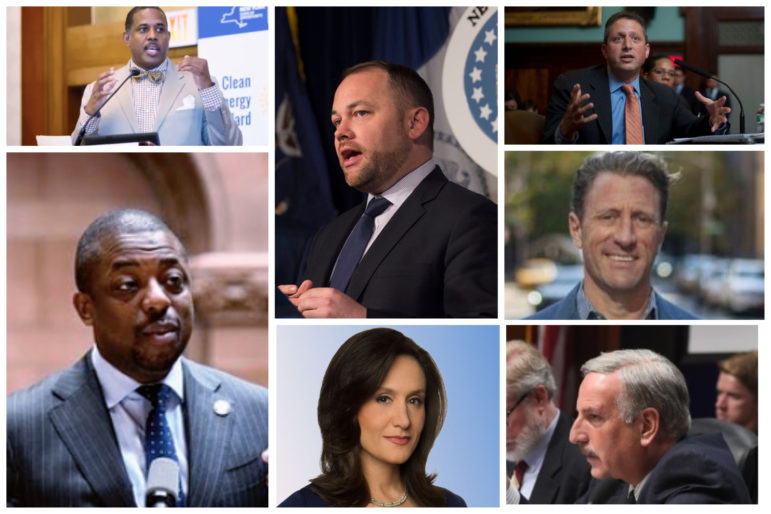Although overall more tame than the most recent Democratic and Republican debates for mayor, Wednesday’s event was not without fireworks. Within the first few minutes, Caruso-Cabrera, who ran for Congress against Rep. Alexandria Ocasio-Cortez in 2020, attacked Council Speaker Corey Johnson for New York City’s swelling budget.

Iscol and Caruso-Cabrera campaigns, NYC Council, NYS Senate, NYS Assembly
The crowded Demmocratic field for NYC comptroller.Seven Democratic candidates for New York City comptroller participated in a debate Wednesday night, the first of two opportunities this week that the group vying to replace Scott Stringer will have to argue their ideas before voters.
State Sen. Brian Benjamin, former financial journalist and failed Congressional candidate Michelle Caruso-Cabrera, nonprofit executive Zach Iscol, City Council members Corey Johnson and Brad Lander, State Sen. Kevin Parker and Queens Assemblymember David Weprin took part in the WABC radio debate on Wednesday, moderated by Dominic Carter.
The city’s comptroller—second in line to succeed to the mayoralty in an emergency, after the public advocate—is charged with oversight of the budget, auditing city agencies, reviewing contracts, as well as managing the city’s debt and its five public pension funds. The position can also be used to propose policy changes: current Comptroller Scott Stringer, for instance, has issued dozens of reports during his time in office on everything from playground to climate change.
Although overall more tame than the most recent Democratic and Republican debates for mayor, Wednesday’s event was not without fireworks. Within the first few minutes, Caruso-Cabrera, who ran for Congress against Rep. Alexandria Ocasio-Cortez in 2020, attacked Council Speaker Corey Johnson for New York City’s swelling budget.
“The city budget under Corey Johnson has gone up $20 billion per year,” Caruso-Cabrera, the sole woman on the stage, said in her opening remarks. “And does this city feel $20 billion per year better to you?”
It was an attack Johnson came prepared for, firing back at Caruso-Cabrera for running as a Democrat when she had previously embraced more conservative positions. The current Council speaker, previously a contender for mayor, even came armed with excerpts of Caruso-Cabrera’s 2010 book that called for scrapping Social Security and Medicare.
“We’re starting off hot and heavy here at the opening of the debate,” Johnson said. “It’s not surprising to me that a lifelong Republican until 2015 … would criticize us adding money to summer youth programs, to a Fair Fares program for New Yorkers living in poverty, to the social safety net of New York City — that is what we have done — to universal pre-K expanding into universal 3K.”
“I didn’t think it would start this early,” Carter, the moderator, said of the exchange.
It wasn’t the only time the two traded attacks over the course of the debate, which focused on topics ranging from city spending and the comptroller’s audit powers to de Blasio’s performance.
Responding to a cross-examination question from Johnson on the city’s cash-on-hand balance, Caruso-Cabrera — who, embarrassingly, didn’t know the answer — likened Johnson to the current mayor.
“This is a very typical career politician moved to try to demean the one woman who is standing on the stage,” she said, telling Johnson, “This city is a mess. And it’s because of you. And if you become comptroller, it’s going to be de Blasio 2.0.”
“I don’t think the question was answered,” Johnson responded.
Four takeaways from the Wednesday night debate below:
- All of the candidates on stage Wednesday agreed that the Comptroller’s audit process should be changed. Currently, the city charter mandates each city agency be audited once every four years, something many candidates said was inadequate.
“I actually will audit every agency, every year,” Weprin said. “The charter only requires you to audit some aspect of every agency once every four years. To me, that’s ridiculous, we should be doing a much more frequent audit schedule, and we should be looking at the very large outside contracts.”
Some candidates also proposed annual audits of some of the city’s largest agencies.
Johnson said he would specifically prioritize four agencies “given the impact that they have on Yorkers’ lives, and the size of their budgets”—the Department of Education, Department of Homeless Services, Department of Housing Preservation and Development and the NYPD.
“We are spending way too much money paying out on settlements against police brutality, and we need to look at that,” he said.
Others suggested an overhaul of the existing audit system, though were light on specific details.
“I think about the audit function a little bit differently than everybody else,” Iscol said.“I don’t think you solve problems by how much spending you’re doing, you solve problems by focusing on what the solutions are. And we need to get the audit process into the 21st century. What do I mean by that? We have to audit the city’s response to specific problems.”
- One of Johnson’s biggest ideas for the Comptroller role is actually something his colleague, Brad Lander, has introduced in the Council.
Responding to a question about what the comptroller can do to help New Yorkers who are struggling because of the COVID-19 pandemic, Johnson said he would ensure that federal money for the city’s recovery is properly tracked and spent.
“You have to make sure that the money is being spent wisely, appropriately, prudently, strategically,” Johnson said. “I proposed setting up a COVID-19 dashboard to track all of that federal money that’s coming in. We need to look at this money as a one shot deal and not spend it all at once.”
In his response, Lander, who recently snapped up coveted endorsements from Rep. Ocasio-Cortez and Elizabeth Warren, among others, said that was something he is already working on in his capacity as a councilmember.
“It’s great to hear that the speaker wants to track the American Rescue Plan funding,” Lander said, “as I’ve introduced a bill in the City Council to do it. We can pass it at next week’s Council meeting, and that would actually make sure that we track every penny.”
Lander’s bill, Int. 2324-2021, was introduced late last month, and would create a database that specifies the uses of federal funding in the city’s fight against COVID-19.
- The candidates appeared most eager to attack Johnson
Johnson, the Council speaker, is among the better-known names on the June 22 primary ballot. He’s also leading the pack in the comptroller race, according to recent polling, though more than 40 percent of those surveyed this week said they were undecided.
Johnson’s rivals seized on his Council record, with four of the seven candidates — Caruso-Cabrera, Iscol, Lander and Parker — choosing to ask the Speaker about it during the cross-examination part of the debate. Lander accused him of playing political games with funding for anti-homelessness organizations in the just-passed budget and Caruso-Cabrera, in a high point for her in the Wednesday debate, pressed Johnson about taking campaign contributions from lobbyists despite pledging not to.
The term-limited Manhattan Councilmember fended off the critiques fairly well, even promising to promptly review his contributions and return lobbyist money “tomorrow.”
- In the lightning round, the candidates were split on key issues.
One of the most interesting and informative parts of the debate was the lightning round, during which Carter, the moderator, peppered the candidates with a series of “yes” or “no” questions. Despite protests from the candidates, the segment was expertly managed, eliciting some of the more concrete, though brief, responses of the evening.
“Politicians do a lot of talking, basically saying very little,” Carter said. “You can only respond yes or no, we’re not interested in the explanation, we’re not interested in backstory. We just want yes or no.”
The only points the candidates unanimously agreed on was that city spending is growing too fast, marijuana should be legalized, and that city schools are not improving.
On whether de Blasio was a good mayor, they were split: Benjamin, Parker, and Weprin said yes and Caruso-Cabrera, Iscol, and Lander said no. Johnson did not provide a “yes” or “no” answer. Caruso-Cabrera, Iscol, and Weprin said taxes should not be increased for the city’s wealthy; Benjamin, Johnson, Lander, and Parker agreed they should.
Candidates also disagreed on the closure of Rikers (Caruso-Cabrera, Iscol, and Parker supported keeping it open); and whether crime is “out of control” (Benjamin and Caruso-Cabrera said no).
The candidates debate again Thursday night on NY1.










One thought on “Four Takeaways From NYC’s Democratic Comptroller Debate”
Thank you Ese Olumhense for this excellent write up, you perfectly captured and condensed the event.